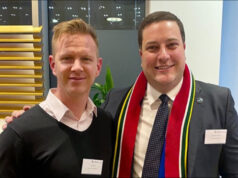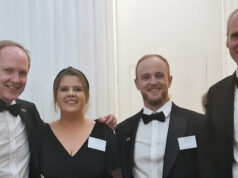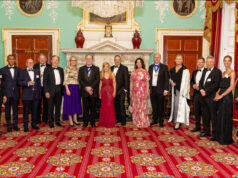By John Battersby
The hallowed halls of the British establishment opened its doors – and its heart – this week to embrace the role of the Rivonia accused in providing inspiration and hope in the darkest days of apartheid and giving the country the opportunity of forging a just and democratic future. The red carpet was unfurled for Denis Goldberg, Ahmed “Kathy” Kathrada, George Bizos and Lord Joel Joffe – and Andrew Mlangeni represented by his son, Sello, in his father’s absence due to ill health.
Goldberg and Kathrada, once branded as terrorists and criminals by the British government, were embraced in the inner sanctum of 10 Downing Street and their life achievements celebrated at a meeting with British Prime Minister David Cameron and a moving ceremony at Guildhall where the four were awarded the Freedom of the City of London. The formal British ceremony – steeped in tradition dating back to the 13th Century- in the impressive Guildhall chamber contrasted with the down-to-earth and informal interaction of the visiting South Africans. But the British hosts appeared comfortable with the mingling of the two.
The Freedom of London ceremony was attended by the Lord Mayor of the City of London in Guildhall, the administrative headquarters of the City of London Corporation, and was followed by a formal lunch for 40 hosted by the “Chief Commoner” on Wednesday in a whirlwind three days of high-level events. Lord Joffe, who was the instructing attorney in the Rivonia trial and wrote the definitive book on the trial, described advocate (barrister) George Bizos as one of the greatest “silks” of his generation and a “brilliant strategist”. Joffe, the leading South African philanthropist in the UK, invited 50 guests to the gala evening to recognise their key role in the anti-apartheid struggle. He has devoted much of his life to ensure that the role of Bram Fischer QC as head of the Rivonia legal team is given due recognition. Apart from Downing Street and Guildhall, the visit included a gala event at London’s premier Grosvenor House Hotel attended by 750 people, a packed panel event at The Guardian newspaper and a meeting with lawyers at the House of Lords.
Cameron praised the Rivonia veterans for their leadership and courage following a 30-minute conversation with the four and Baroness Patricia Scotland, now Secretary-General of the Commonwealth, praised them for having sacrificed their own lives and freedom for the freedom of others. At the gala evening, one of the keynote speakers – Makaziwe Mandela, the late Nelson Mandela’s eldest daughter – praised the Rivonia veterans for “speaking truth to power even when it is their own government”. She said that her father dreamed of a “glorious new South Africa” in which there would be no betrayal of colleagues. “We children paid a price but it was worth it,” Mandela said. “Today we have a better quality of life.”
Baroness Scotland, the first woman and the first black Briton to occupy the role of Attorney General of England and Wales (2007-2010), said that Nelson Mandela and his colleagues in the Rivonia trial had personally inspired her to become a lawyer. “Each of you are the embodiment of freedom because you gave up your own freedom for the freedom of others,” said Baroness Scotland who is also the first black woman to be an alderman (councillor) in the City of London. “For giving me my freedom it is a great honour to be part of a ceremony awarding you the Freedom of the City of London,” she said.
At the Guildhall ceremony the four Rivonia heroes were required to swear allegiance to the Queen and were presented with little books instructing them how to be good citizens. Goldberg winked in the direction of the audience in several occasions and kept his fingers crossed. Being a Freeman of London, which once held great practical advantages for being allowed to trade freely in the City, is now of purely symbolic value. It allows Freeman to drive their sheep across London Bridge to the Smithfield meat market.
Nelson Mandela and Archbishop Tutu were both recipients of the award as was the Bafana Captain Aaron Mokoena in 2010 and former South African High Commissioner Zola Skweyiya. Goldberg, whose task was to build up arms and ammunition for the violent , but non lethal, overthrow of the apartheid state through a campaign of sabotage against buildings in the 1960’s, was the de facto spokesman for the group and entertained his hosts with his down-to-earth frankness in defending the actions and intentions of the Rivonia insurrectionists. “There was never any doubt in our minds that apartheid would die before we did,” he said. “The only surprise was that it took so long,” said Goldberg who called in a BBC interview during his visit for a renewal of the leadership of the African National Congress at every level of Government. “I have no regrets about what we did – not one,” he said. “But we could have done better…we could have done it more effectively.”
Goldberg was speaking at a panel chaired by Lord Hain of Neath, himself a leading anti-apartheid campaigner who led the stop-the-tour boycott and went on to become Leader of the House of Commons and was enobled last year as a labour Peer. Hain was three times a Minister in the last Labour Government. The visit was the brainchild of Sir Nicholas Stadlen, a retired English High Court judge who interviewed Denis Goldberg two years ago and became fascinated with the Rivonia trial and its central place in South Africa’s transition as well as its lessons for a troubled world. As a former High Court Judge, Stadlen was particularly intrigued with the paradox which was central to the South African dilemma: that in order to end oppression and improve or overthrow unjust apartheid laws which the majority had not voted for and which they had no legal power to vote against, the Rivonia group concluded that they had no option but to break the law. He is planning to create a mulitmedia website under the umbrella of a charity know as “Life is Wonderful” which was also the name of the gala event on Monday night. It captures the moment of sentence in the Rivonia trial which was literally a matter of life and death. Goldberg’s mother called out to him: What is it? “Life,” he replied. “Life is Wonderful”.
Stadlen’s mission is to make the Rivonia story accessible to a wider global audience and particularly to the youth and leaders of tomorrow to inspire them with the qualities exemplified by the Rivonia group: courage, commitment ,integrity, selflessness and belief that ordinary people can change the world. Kathrada said that there were three key elements that made Mandela such a potent leader. Firstly, he made clear to us that in prison we were no longer leaders and could not give instructions to those outside. “He made it clear that it was our job to look after those who were in prison,” he said. Secondly, Mandela said that the focus of their struggle in prison should not be directed against the systematic humiliation they were subjected to in jail (although they were unflinching in their refusal ever to compromise their dignty), but that they should keep their focus on the long-term objectives. Thirdly, Mandela participated personally in the various hunger-strikes that were held in prison.
The visit was sponsored by the City of London and a gala event in aid of the global charity Global Citizen which runs campaigns and lobbies with governments to end poverty in line with the UN Millennium Development Goals. The audience was studded with celebrities and former Prime Ministers including former Australian Prime Minister, Kevin Rudd, and the former Prime Minister of Denmark.
The proceeds of the fundraising gala will be divided amongst the charitable foundations of the three Rivonia veterans and Global Citizen.










